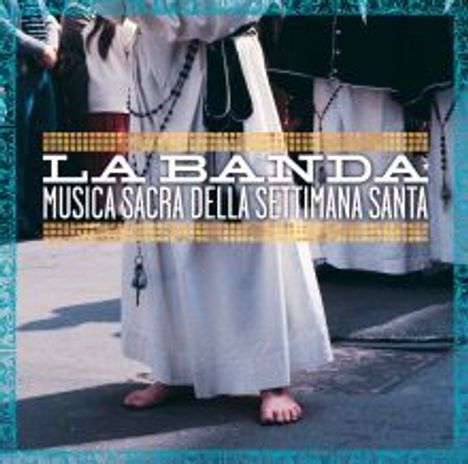La Banda: Musica Sacra Della Settimana Santa auf CD
Musica Sacra Della Settimana Santa
Herkömmliche CD, die mit allen CD-Playern und Computerlaufwerken, aber auch mit den meisten SACD- oder Multiplayern abspielbar ist.
(soweit verfügbar beim Lieferanten)
- Label:
- enja
- Aufnahmejahr ca.:
- 2009
- Artikelnummer:
- 1531485
- UPC/EAN:
- 0063757954927
- Erscheinungstermin:
- 19.8.2013
La Banda, eine italienische Brass-Band, bestehend aus mehr als 30 Bläsern (Flute, Oboe, Clarinets, Saxophone, Flügelhorn, French Horn, Trumpets, Trombones, Tuba u. a.), präsentiert auf diesem Album eine musikalische Tradition, die vor sehr langer Zeit im tiefen Süden Italiens entstanden ist, um die österliche Karwoche zu feiern.
In den zwanziger Jahren, als in Süditalien wirkliche Not, Hunger und Elend herrschten, konnten dank dieser beiden Männer Hunderte ärmster Kinder in die Welt der Musik eintreten und ein Lebenszentrum finden. Noch heute bestehen die Banda Brass Orchester zum großen Teil aus Amateur-Musikern.
Man wird dieser Musik nicht gerecht, wenn man sie nur als Begräbnis-Ritual versteht. Man begegnet hier komplexen, musikalischen Juwelen, die von alters her, von Generation zu Generation weiter gereicht werden und die im historischen Gedächtnis auch in spiritueller Hinsicht große Bedeutung haben. Die Prozessionen schaffen eine Spiritualität und Hingabe, die man mit ähnlichen Vorgängen in Spanien vergleichen kann. Sie gehen wohl zurück ins dritte Jahrhundert, zur Heiligen Darstellung des Kreuzweges, die unsere Mysterien begründete.
Jede Stadt, jedes Dorf hat seine eigene, individuelle Prozession, beherrscht von starker Mystik, die Musiker und Teilnehmer tief ergreift.
“It was a real miracle to have been able to play some of the “Music of the Holy Week” of Ruvo di Puglia in Paris, in a beautiful place – the Basilica de St. Denis during the 40th anniversary of its festival.
This manoeuvre, which documents an extraordinary musical tradition, was inspired by the rites of the Holy Week which were born and developed in the South of Italy. The main composers are three great men of artistic value: Luigi Cirenei, who since 1925 with his work and compositions has given importance and nobility to the sound of the Carabinieri Banda; the brothers Antonio and Alessandro Amenduni, who in the Funeral March – for pathos - touch the highest expressive point of their artistic production with a deep, sincere inspiration. At a time when there was actually hunger, poverty and misery – we are talking about 1922 – thanks to these two men, hundreds of “children of the population” entered and became part of the music world making it the main activity of their life.
I personally think that it is absolutely curtailing to call these compositions Funeral Marches as we often find ourselves in front of something much more complex and deep; they are certainly real musical jewels to save and to hand down to future generations as a historical memory of great value, not only musical but also spiritual. In such a troubled and confused time to dig out the most authentic and moving traditions from history to find soul and beauty means to strengthen one’s own roots and therefore our identity.” (Pino Minafra)
“The Holy Week is an event of as intense atmosphere and emotional participation for the people of Puglia. During these days an invisible line seems to connect the people of this region throughout the many towns which live again the centuries old customs, habits and rites intensely.
The processions create a journey of faith and spirituality which does not stand back from the well known processions in Spain. They express a moment of strong social brotherhood whose very particular rites express a close devotion, intimate and rich in pietas which spreads out to the popular participation. Processions which probably date back to Middle Age Laude or the Sacred Representation of the third century which possibly are at the origin of our Misteri as a representation of the most meaningful and spiritual moments of the Via Crucis. Every city, town and village has its own procession and its own particular way passed down through the centuries. A strong mysticism is felt by all the people and visitors present at the event. As a matter of fact many processions organized by the Confraternity since the 17th century involved and still involve the whole population with strong emotion, making these rites particularly fascinating." (Cleto Bucci)
Disk 1 von 1 (CD)
-
1 Requiescat In Pace
-
2 Giorno Di Dolore
-
3 Tristezza
-
4 A Mi Madre
-
5 Vivo Cordoglio
-
6 Il Pianto Dell 'Orfano


